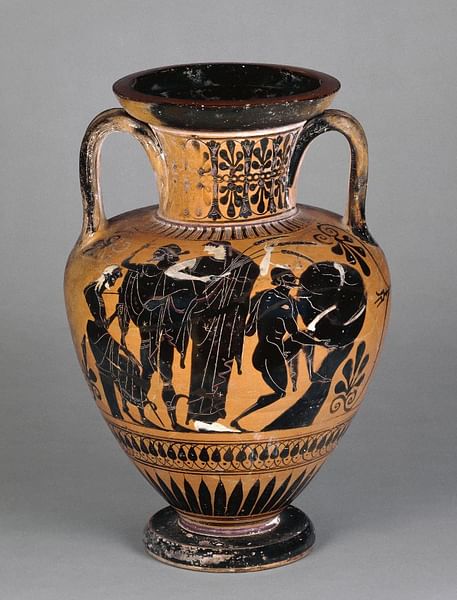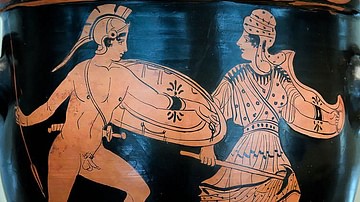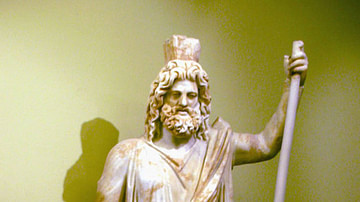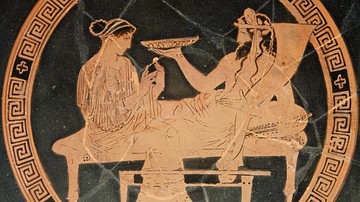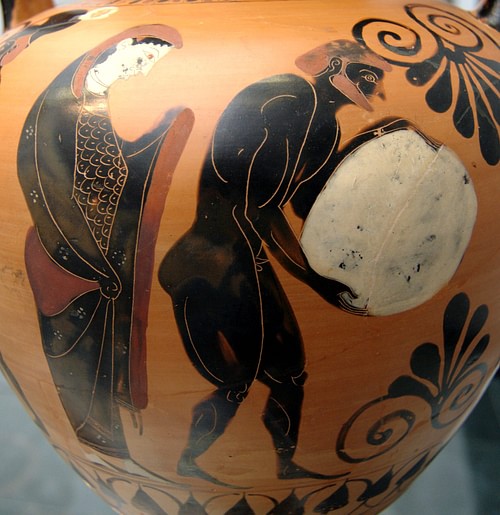
Sisyphus (or Sisyphos) is a figure from Greek mythology. He was king of Corinth and became infamous for his general trickery when he twice cheated death. Sisyphus ultimately got his comeuppance when Zeus dealt him the eternal punishment of forever rolling a boulder up a hill in the depths of Hades.
Sisyphus was the founder of the Isthmian Games and grandfather of the hero Bellerophon. Sisyphus remains best remembered as a poignant symbol of the folly of those who seek to trifle with the natural order of things and avoid humanity's sad but inescapable lot of mortality. The adjective 'Sisyphean' denotes a task which can never be completed.
Sisyphus Cheats Death
In Greek mythology, the story of Sisyphus has multiple and often contradictory versions with embellishments added over time so that the only point of certainty is his terrible punishment. He was the son of Aeolus, described by Homer as a human who rules the winds. Sisyphus is credited with being the founder and first king of Corinth. He gained infamy for his trickery and wicked intelligence, but his greatest feat was to cheat death and Hades himself, not once but twice, thus living up to Homer's description of him as "the most cunning of men" (Iliad, 6:153). In the first episode the king, after dying and descending into Hades, audaciously managed to capture Thanatos, the personification of Death, and chain him up so that no humans died thereafter. Only the intervention of Ares resolved the crisis, and Death was freed to pursue his natural work.
The second episode proved more successful. After dying for the second time and once again finding himself in the shady underworld, Sisyphus persuaded Hades to let him out back into the bright realm of the living. For the king had cleverly arranged for his wife not to provide the usual offerings and sacrifices that were due on her husband's death. Working on the kind-hearted wife of Hades, Persephone, the king pleaded that if he were released he would be able to instruct his wife to carry out the proper rituals and all would be well. On his release, Sisyphus, naturally, made no attempt to return to Hades but lived to a ripe old age, largely thanks to Death now not wanting to go anywhere near him following his previous experience of being put in chains.
How Did Zeus Punish Sisyphus?
When the king died yet again, there was to be no escape for him this time as Zeus himself now intervened. The king of the gods made sure that humans would not be encouraged by the feats of the trickster Sisyphus. His fate would have to be long and tedious. In Homer's Odyssey the hero Odysseus descends into Hades and, coming across many a fallen hero, he sees Sisyphus and his eternal punishment:
Then I witnessed the torture of Sisyphus, as he wrestled with a huge rock with both hands. Bracing himself and thrusting with hands and feet he pushed the boulder uphill to the top. But every time, as he was about to send it toppling over the crest, its sheer weight turned it back, and once again towards the plain the pitiless rock rolled down. So once more he had to wrestle with the thing and push it up, while the sweat poured from his limbs and the dust rose high above his head. (Odyssey, Book 11:593)
Autolycus & Other Associations
In another tale, Sisyphus used his cunning to finally catch Autolycus, the grandfather of Odysseus and infamous thief. Sisyphus cleverly attached lead tablets to the feet of his own cattle herd, and so when Autolycus stole them, Sisyphus was able to follow the tracks and catch the thief red-handed. The tablets had all been inscribed with the words 'Autolycus stole them.'
Sisyphus was also the founder of the famous Isthmian games of Corinth, held every two years in honour of Poseidon, and one of the four major Panhellenic games which included the Olympic games. Sisyphus was succeeded as king of Corinth by his son Glaucus – he who was ripped to pieces by his own flesh-eating horses – and then his grandson Bellerophon, whose winged horse Pegasus became a symbol of the city and a feature of Corinthian coins.
How is Sisyphus Represented in Art?
The Underworld was a relatively rare subject for Greek vase painters, but there are a dozen or so vases from the 6th century BCE showing Sisyphus. On one Athenian black-figure amphora, dating to c. 510 BCE and now in the British Museum, a scene of Sisyphus' punishment is captured. The trickster pushes a huge boulder up a slope using his arms and a knee while Hades, Persephone, and Hermes look on. Another example is a black-figure amphora in the Staatliche Antikensammlungen of Munich which dates to 530 BCE and again shows Persephone looking on as Sisyphus carries his boulder, this time, unusually painted in white. The boulder pusher myth returns in popularity during the 4th century BCE when it is shown on the interior of several red-figure cups and appears on a number of similar-dated red-figure vases which show multiple figures from the Underworld. In one of the latter examples, Sisyphus has the additional punishment of being whipped by one of the Furies who wears a panther skin.
In sculpture, Sisyphus appears on a c. 540 BCE sandstone metope from the Heraion of Foce del Sele near Paestum. Here the hapless trickster not only has to roll his stone up a very steep-looking hill but is at the same time attacked from behind by a winged demon.
